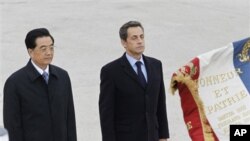Chinese President Hu Jintao is in Paris for a state visit expected to finalize multi-billion-dollar trade deals between China and France. Human rights advocates have complained that French President Nicolas Sarkozy has not put the contentious issue of human rights on the agenda.
The France visit is the first foreign trip for Mr. Hu since this year's Nobel Peace Prize was awarded to jailed pro-democracy campaigner Liu Xiaobo last month. The two leaders have not scheduled a joint press conference as is customary during a state visit. That has led to speculation they are seeking to avoid questions about the Nobel winner.
VOA spoke with Amnesty International China researcher Corinna-Barbara Francis about the visit.
Q: How should European countries address human rights issues with China during the Paris talks?
A: "We feel that it is critical for both countries, as well as international organizations like the U.N. and their spokespeople, to raise human rights issues with the Chinese authorities, both in private settings as well as in public. The Chinese people, Chinese civil society is looking to the international community for support in what is often for them an extremely risky course of action in demanding and trying to promote human rights progress within China. The fact that we would not stand out in support of those people is truly a shame. For countries to not stand on the right side of that issue is very disturbing, and so we absolutely call on countries, their leaders, international organizations and their leaders to speak publicly, as well as privately on these issues."
Q: Meanwhile, there is a report that the Chinese government is pressuring European countries, such as France, to avoid the Nobel Peace Prize ceremony honoring Liu Xiaobo next month. Are you aware of this?
A: "China is pressuring world leaders to boycott the Nobel Peace Prize, it's actually difficult to find words to describe that. The Nobel Peace Prize is recognized throughout the world as an independent assessment of individuals who have contributed in very important ways to world peace, to human rights progress. And for the Chinese to be pushing others to boycott that is in the first place is making themselves look a bit ridiculous. And secondly, the Chinese authorities are constantly carrying on about not interfering in other nation's affairs. It seems to be an obvious intervention in other countries's internal affairs to be trying to get them to boycott the Nobel Peace Prize. And it's well known that the Chinese have a very strict regime of censorship and of repression of individuals who are simply trying to speak out to promote human rights, which is the case with Mr. Liu Xiaobo.
Q: It may seem obvious, but why is the Chinese government so rankled by the awarding of this very distinguished award to one of China's own?
A: "His [Liu Xiaobo's] crime, his so-called alleged crime, is speaking out, writing articles, organizing petitions calling for improved political reform, nothing that the international community would consider a crime. You know, first the virulent reaction on the part of the Chinese authorities to his winning the prize is an indication of how they are regarding human rights and their own country. But for the Chinese to take that step further, and to actually pressure diplomats and world leaders to boycott, is in a sense trying to export their own regime of censorship to the international stage, which is a very disturbing process. And this is not the first time we're seeing that happening. Chinese authorities around the world adopt a lot of actions that are very interventionist in terms of trying to crack down either on their own artists who try to perform abroad. We have examples of the Chinese using all kinds of methods to try to derail cultural events taking place around the world which might feature a Chinese artist that they happen not to like, that has happened to some of the best known Chinese artists, Chinese musical groups around the world. So this is not a new pattern we're seeing, but it is a disturbing one."
Three Questions: China, France and Human Rights




